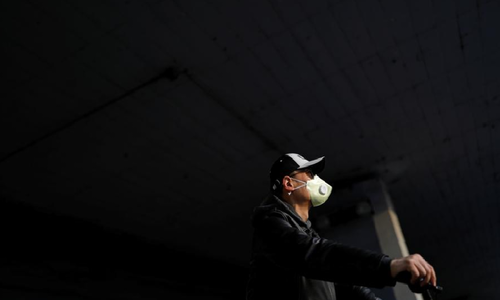PARIS: The coronavirus pandemic is battering the world’s major economies and could trigger the deepest global recession in generations, experts warned on Wednesday, as rising death tolls in Europe and the US dampened hopes for a quick turnaround.
While the Chinese city where the virus was born, Wuhan, has been released from its nearly 11-week lockdown, much of the West remains in the throes of a crisis that has killed more than 80,000 people worldwide.
The pandemic had killed more than 60,000 people in Europe alone by Wednesday evening, according to a tally based on official data.
That figure accounts for more than 70 per cent of the deaths officially recorded worldwide. Italy remained the worst-hit country, with 17,669 deaths followed by Spain with 14,555.
Britain reported a record 938 new Covid-19 deaths in its daily update, 152 more than its previous highest toll, as the total number of deaths topped 7,000.
With 17,669 deaths, Italy remains the worst-hit country, followed by Spain with 14,555
The United States surpassed 400,000 coronavirus cases, according to a tally kept by Johns Hopkins University.
The pandemic has now claimed the lives of at least 12,936 people in the US, which leads the world in the number of confirmed infections with 401,116, by the Baltimore-based school’s count.
The 300,000-case milestone was passed on Saturday.
The US death toll is approaching those of hard-hit Italy.
Meanwhile, the hardest-hit economies, among them Italy, Spain, France and the US, are wrestling with how to balance public safety with the devastating impact of lockdowns that have shuttered whole sectors of the economy and erased millions of jobs in a matter of weeks. The economic forecasts are dire.
The fallout “may well be the deepest economic recession or downturn of our lifetimes”, warned the chief the World Trade Organisation, Roberto Azevedo.
Global trade growth could fall by up to a third this year, the WTO said.
France has already recorded its worst economic performance since 1945 during the first quarter, shrinking some six per cent.
Germany’s economy, the biggest in Europe, is also expected to fall into a “serious recession” and contract by nearly 10 per cent in the second quarter, leading researchers warned.
Yet health experts stressed it is too early to loosen restrictions.
They say premature moves could accelerate the spread of a disease that has already infiltrated every layer of society, from refugees to royals to Britain’s Prime Minister Boris Johnson, who was reported to be “stable” during his third day in intensive care.
“Now is not the time to relax measures. It is the time to once again double and triple our collective efforts to drive towards suppression with the whole support of society,” said the World Health Organisation’s Europe director Hans Kluge.
In the ground-zero Chinese city of Wuhan, which led the world with its unprecedented lockdown in January, strict measures appear to have paid off.
After a months-long travel ban was finally lifted, tens of thousands of people fled the city in joyous scenes that contrasted with the macabre mood around much of the world — even if some passengers were travelling in hazmat suits.
Published in Dawn, April 9th, 2020















































